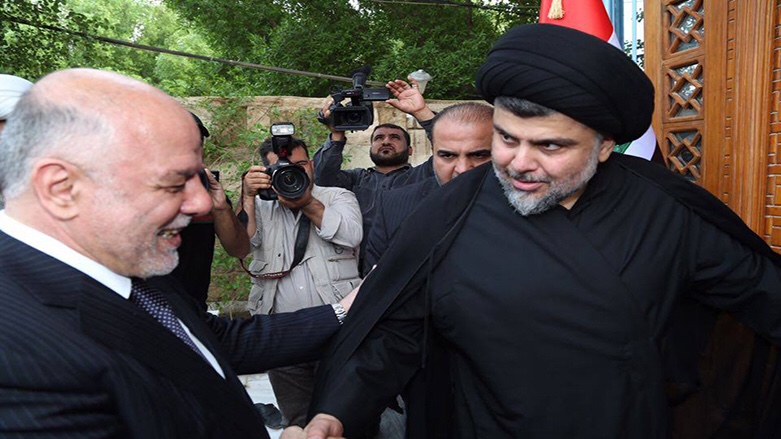 Sadr, Abadi form ‘core’ parliamentary bloc with Hikma, Watanyah
Sadr, Abadi form ‘core’ parliamentary bloc with Hikma, WatanyahERBIL, Kurdistan Region – Iraq took a major step closer to forming a new government on Sunday, hours after the Federal Court finally ratified the May 12 election result.
Talks took place on Sunday evening at Baghdad’s Babylon Hotel between Muqtada al-Sadr, Iraqi Prime Minister Haider al-Abadi, Ammar Hakim, and representatives of al-Watanyah.
“In a national Iraqi decision springing from the interest of our country, and responding to the demands of the people, we agreed today to form the core of an alliance that will seek to form the parliamentary bloc that can form the government,” reads a joint statement issued following the meeting.
The parties said they are open to other partners joining them, insisting the alliance is “cross sectarian and refuses partisanship in all of its forms”.
The new alliance “will seek to seriously and actively contribute to forming a government that works seriously to provide services, rebuilds, return IDPs, fights corruption, and holds the corrupt accountable,” the statement added.
Sadr, whose Sayirun alliance won the most seats in the May 12 election, arrived in Baghdad earlier on Sunday to personally participate in talks.
The announcement comes after Iraq’s federal court officially approved the results of Iraq’s May 12 parliamentary election earlier on Sunday.
Sadr’s grouping is one of two teams vying to create the biggest bloc in the Iraqi parliament.
The rival bloc is led by former Iraqi PM Nouri al-Maliki. It includes Maliki’s State of Law coalition and Hadi Amiri’s Fatih (Conquest) alliance – a coalition of Hashd al-Shaabi paramilitias.
Kurdistani parties are in the middle with each side competing for their support.
“It is clear there are two axes competing on forming the biggest bloc, and this is good politically. But the question is what if one of those axes fails? Will it concede to becoming the opposition? Or will it throw that out of the window and demand to join, even if it means a government of partisanship? On our side, we will commit,” Qais al-Khazali, leader of Asaib Ahl al-Haq, and prominent pro-Iran leader, said in a tweet on Sunday.
The newly formed Sunni National Axis Alliance is in Erbil holding talks with Kurdish parties.
No comments:
Post a Comment